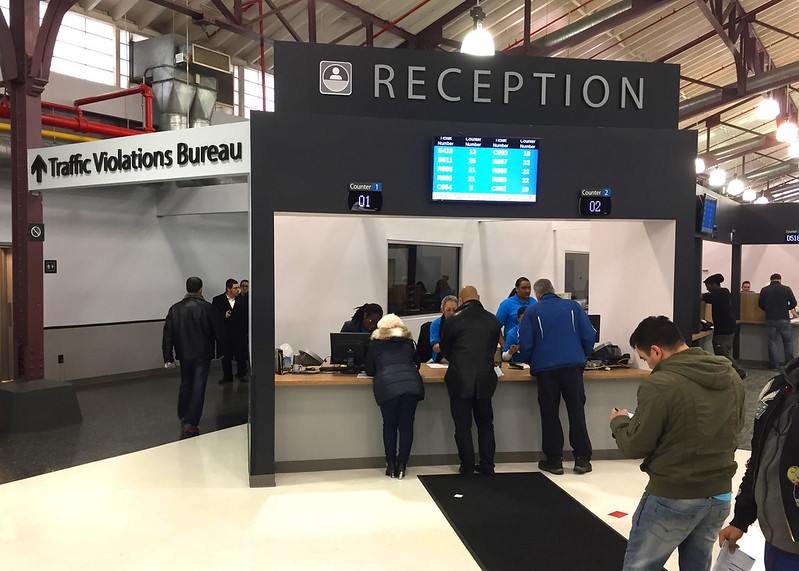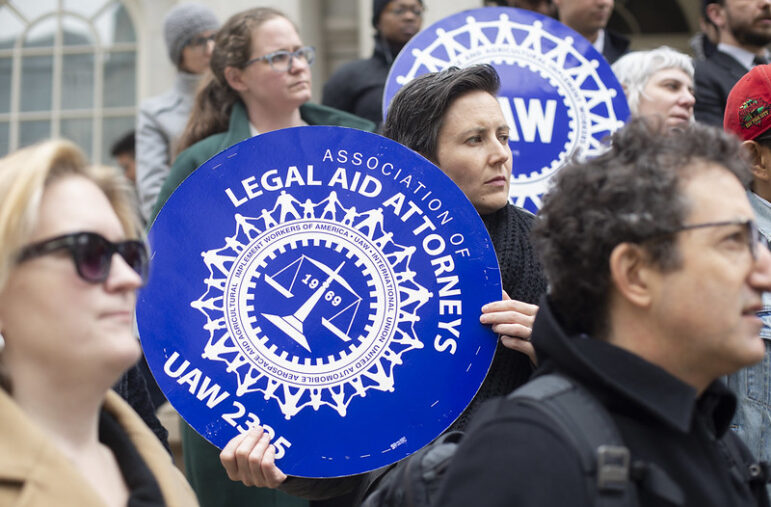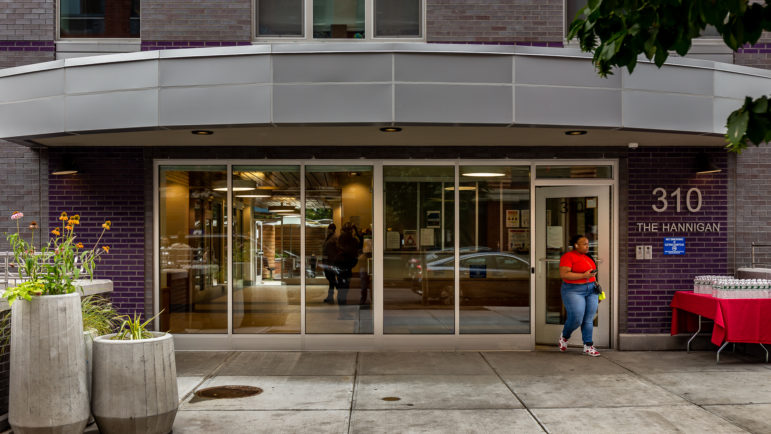“Having a license has changed us,” said Luis Jiménez, president of the farmworker-led, grassroots organization Alianza Agrícola. “For me personally, it allowed me to take my children to school, and their medical appointments, without the fear of being stopped by the police and asked for a license.”

Flickr/NYS DMV
The Department of Motor Vehicles in Coney Island, Brooklyn, in 2017.Lea la versión en español aquí.
In 2019, New York passed the Driver’s License Access and Privacy Act, commonly known as the “Green Light” Law.
It allows all New Yorkers age 16 and older to apply for a standard, not-for-federal purpose, non-commercial driver’s license, regardless of immigration status—allowing undocumented residents to work and drive safely without fear of criminalization, its supporters say.
“Before the law, there was isolation,” explained Luis Jiménez, president of the farmworker-led, grassroots organization Alianza Agrícola.
“As undocumented immigrants, licenses do not solve our lives but allow us to move and families appreciate that,” said Jiménez, who, like thousands of others, obtained a driver’s license under the law. “But with this lawsuit, many of us are at risk.”
Last week, the new U.S. Attorney General Pam Bondi announced a civil complaint challenging New York’s Green Light Law, saying it limits federal immigration officials from accessing state Department of Motor Vehicle (DMV) data.
The law includes privacy protections that limit data sharing, and “requires disclosure to the license holders when immigration enforcement agencies request data from DMV,” according to the New York DMV’s website.
“It’s tipping off an illegal alien, and it’s unconstitutional, and that’s why we filed this lawsuit,” Bondi said in announcing the challenge last week.
But advocates say there is more to the lawsuit, since the state law does not prevent federal immigration authorities from accessing DMV data “whenever a lawful court order, judicial warrant, or subpoena” is issued.
Alaina Evelyn Varvaloucas, executive director of the Worker Justice Center of New York, said this is the same standard that immigration enforcement has to follow everywhere.
“They can’t go into anybody’s house without either permission or a judicial warrant. So it’s really not all that different from the rights that people have in any other context,” Varvaloucas said.
State Attorney General Letitia James’ Office—one of the defendants in the federal suit, alongside New York State Gov. Kathy Hochul, and Department of Motor Vehicles Commissioner Mark Schroeder—said the Green Light law remains unchanged despite the federal challenge, and that Immigration and Customs Enforcement (ICE) can’t currently access the data due to the lawsuit. A spokesperson from New York’s DMV said they have no comment on active cases.
“Our state laws, including the Green Light law, protect the rights of all New Yorkers and keep our communities safe. I am prepared to defend our laws, just as I always have,” James said in a statement last week.
This isn’t the first time the Green Light law has faced pushback. Immediately after its passage in 2019, it was challenged by Erie County Clerk Mickey Kearns and County Clerk Frank Merola, and the AG’s office won both cases.
The first Trump administration targeted the law back then as well, using it as the rationale for excluding New Yorkers from the Trusted Traveler Program, which offers faster screening for pre-approved members at U.S. airports and international borders. In 2020, then-Gov. Andrew Cuomo included an amendment to the law, and the Department of Homeland Security restored the program for New Yorkers.
“Having a license has changed us,” said Jiménez in Spanish. “For me personally, it allowed me to take my children to school, and their medical appointments, without the fear of being stopped by the police and asked for a license.”
Ligia Guallpa, executive director of the Workers Justice Project, said the law has been critical for New Yorkers in the city, but especially vital for those living upstate and in rural areas.
“A driver’s license for New Yorkers who live in rural areas means the ability to survive and live with dignity. New York City is very different because we are lucky to be in a city that has different transportation alternatives,” Guallpa said.
Jiménez agrees that it has brought people out of the shadows of isolation in the Western and Central New York regions.
“Isolation, especially in rural areas, causes depression. It does not allow you to be part of society. It does not allow you to spend,” said Jiménez, adding that the state has seen the economic benefits of the law. “We pay to get licensed, and we buy, register, insure, and maintain the car.”
In January, before Inauguration Day, Tom Homan, acting director of ICE and Trump’s border czar, attacked the New York law in an interview with The Buffalo News, even though 19 states have now enacted similar legislation.
On Thursday, Mayor Eric Adams met with Homan, and right after announced an executive order to “reestablish the ability for ICE agents to operate on Rikers Island.”
Advocates said that announcement, on top of the Green Light lawsuit, are part of a political ploy from the Trump administration to frighten and further destabilize New York’s immigrant communities. Trump has vowed to carry out mass deportations.
“The intention is to create widespread fear in immigrant communities and to drive people into the shadows, and unfortunately, I do think that is happening just with the announcement of the lawsuit,” said Meghan Maloney de Zaldivar, senior director of advocacy at New York Immigration Coalition.
Jiménez explained that fear has spread rapidly since the president took office, and every immigration action he takes compounds it.
“Freedom of movement is a right,” said Jiménez, defending the license policy. “I know a lot of people whose lives have changed. They used to go from home to work and then to the market every two weeks. Now they exercise, go out, and are integrated into the community.”
To reach the reporter behind this story, contact Daniel@citylimits.org. To reach the editor, contact Jeanmarie@citylimits.org
Want to republish this story? Find City Limits’ reprint policy here.








